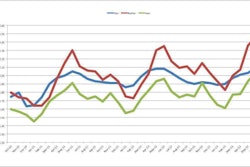
Most notably, The Wall Street Journal published a piece on its website and on the front page of its Marketplace section July 3. Its headline reads “Truckers are losing sleep over 70-hour work limit,” and it calls the rule changes “the most significant overhaul of rules governing truck-driver hours in a decade.”
The article focuses mostly on the business aspect of lost productivity and money and the overall frustration that the new regulations cause trucking companies, citing trucking companies as saying the changes will cost them much for “little benefit.”
It also quotes an independent owner-operator saying he’ll lose more than 10 percent of his annual $300,000 revenue due to the tightening restrictions. It also quotes the American Trucking Associations as saying the rule could cost the industry $1.4 billion a year in business, whereas FMCSA says the rule will cost $500 million.
Click here to see the WSJ piece.
NBC reported on the change this week, too, leading its story with an owner-operator who says breaks are punishing his business. It delves into trucking’s concerns over more congested roadways, as the rules limits flexibility, and higher costs for consumers
Like WSJ’s report, it also cites government data showing that fatalities from large truck crashes have fallen 30 percent since 2000. Also like the WSJ report, it says FMCSA claims the new rules will prevent 1,400 truck crashes a year and save 19 lives. Click here to see NBC’s article.
Lastly, another major national outlet to report on the regulation changes is NPR, whose angle is much more from the consumer side than the business side, like WSJ’s and NBC’s.
NPR leads its piece with the number of deaths caused each year by large truck crashes and the amount that FMCSA says can be prevented by battling driver fatigue. It offers an explanation from FMCSA Administrator Anne Ferro and quotes from two drivers, one who seems to agree with the agency that truck drivers need regulating and one that seems indifferent to the rule but who does allude to an argument that the rules may make drivers have to choose between making money and getting rest.











